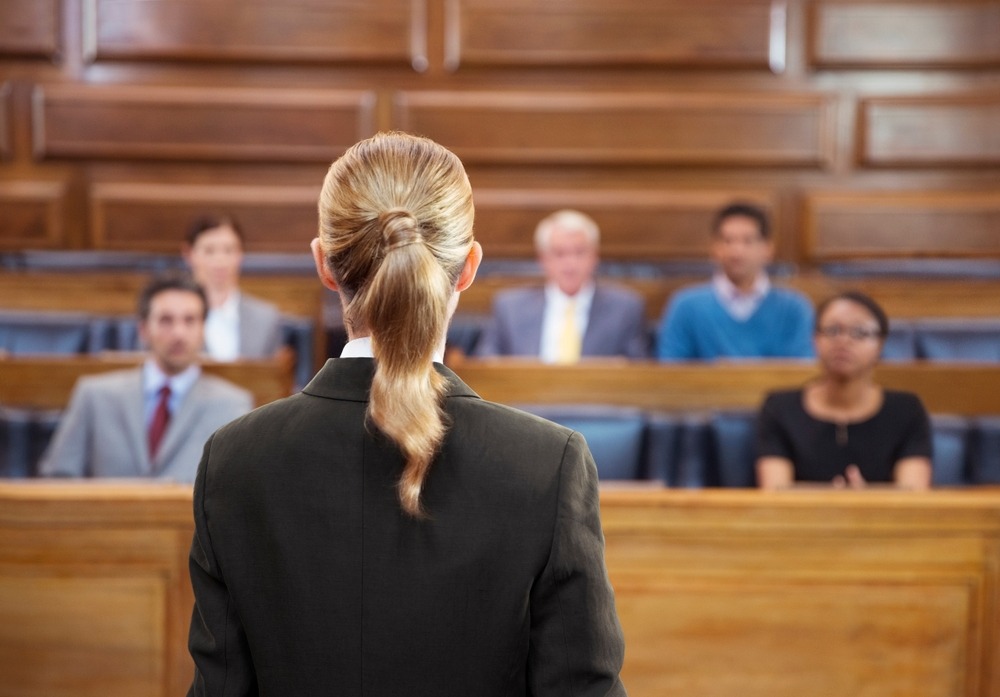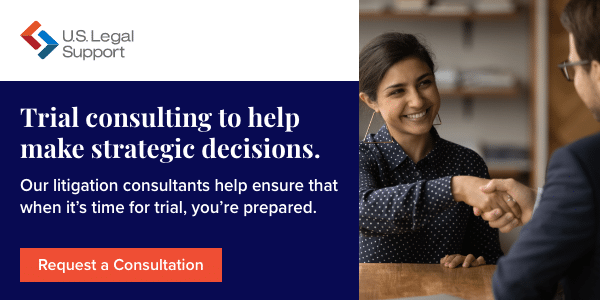Importance of a Jury Consultant in Jury Selection

Wouldn’t it be helpful if potential jurors entered the selection room with a t-shirt that named all the various prejudices, preconceptions, and core beliefs they hold that could impact your case? While it might make for a compelling episode of the speculative science fiction TV show Black Mirror, it’s not going to happen in a courtroom near you.
What you can do, with the help of a professional jury consultant, is identify tendencies and biases of potential jurors based on appearance, speech, visible and declared demographic markers, and other publicly available information. Their role doesn’t end with identifying and analyzing these factors and trends to guide effective strategy during the jury selection process.
A jury consultant is valuable at all stages of a legal case, helping to unlock details that can inform your trial strategy to realize your best possible outcome based on scientifically valid research, data collection and analysis, and predictive modeling.
What Is a Jury Consultant?
The underlying role of a jury consultant is to predict human behavior—primarily that of potential and sitting jurors—as it relates to trial strategy.
Also known as trial consultants, about 42% of jury consultants hold a masters, Ph.D. (doctor of philosophy), or JD (juris doctor) degree and 53% hold a bachelor’s degree in fields such as1:
- Psychology, particularly forensic psychology
- Social sciences
- Communication
- Linguistics
- Trial law
Whatever education they start with, jury consultants need to then secure experience and enhance skills such that they can provide:
- Excellent oral and written skills in both communicating and analyzing communication
- Experience conducting multi-modal quantitative and qualitative research
- Familiarity with the legal process and trial strategy
- Knowledge of the regulations and procedures of the jurisdictions in which they consult
- The ability to synthesize research data and turn it into actionable guidance
They aren’t licensed, but may follow professional standards of practice based on:
- Member guidelines of the American Society of Trial Consultants (ASTC)2
- An early-career internship at a trial consulting firm or department of a large law firm3
- Mentorship through the ASTC
How to Select a Jury Consultant
There is no one-size-fits-all degree program, training requirement, certification, or license for a jury consultant—it’s not a strictly regulated field. That makes it critical to vet a potential trial consultant carefully for the skills and experience you need for a specific case.
Ask about:
- Education and professional history
- Case experience relevant to your practice area and current needs
- Research modalities and strategies
- Communication techniques
- Services available
- Jurisdictional experience
- Published works, presentations, or speaking engagements on jury behavior
- Success rate
- References
Which Cases Require a Jury Consultant
Jury consultation is a valuable tool that can benefit cases ending in settlement or bargain as well as those resolved by a jury verdict. However, there are some situations that make jury consulting especially critical:
- Cases including a celebrity client, witness, or other involved party
- High-profile cases with significant press coverage
- Class action and other cases with the potential of very high monetary or punitive damages
Are jury consultants effective? They have effectively informed strategy, which helps gain a winning edge. The first known use of public polling to identify preferred juror profiles and demographics was in the 1972 Berrigan brothers’ case.3
Daniel and Philip Berrigan were accused of conspiring to plan violent Vietnam War protests. After polling community members similar in demographics on their biases and opinions, the defense stacked the jury with blue-collar workers with secondary educations, and avoided demographics that tended to support the prosecution via polling (college graduates and Protestants such as Episcopalians and Presbyterians).
Benefits of Hiring a Jury Consultant
Using the right jury consultant for a case can provide significant help in attaining the most desirable outcome for your client. There are no absolutes in predicting human behavior, but jury consultants provide the closest possible way to move toward a favorable outcome based on all of the choices you can control along the way. They can help you:
- Provide actionable jury research at both group and individual levels
- Understand which demographic elements are useful in jury selection
- Make the best use of peremptory challenge limits
- Translate minute facial expressions and body language of potential and sitting jurors
- Design screening questions that will unlock critical experiences and beliefs
- Select specific language, examples, and emotional appeals to use or avoid
- Remain agile throughout a trial in response to jury reactions
How Jury Consultants Help Shape Trial Strategies
Jury consultants are able to assist well before jury selection begins by helping you craft and adapt strategies that take you through the verdict. In particular, they provide:
- Early case assessment – How critical is it to work toward a pretrial resolution rather than ending up in a courtroom? What press coverage or statements could work for or against a jury trial? Jury and trial consultants can help you evaluate risks and identify landmines that can impact jury selection and winning over jurors.
- Venue evaluation – Can your client get a fair trial in the current venue? Jury consultants can help you decide whether to push for a change of venue and how it could work for or against your client through surveys, polling, jurisdictional statistics, and community research.
- Focus groups – A focus group can be utilized to gather detailed responses from a small group of community members or target groups. This could be to help evaluate risks and venue choices, argument options, witness value, or any aspect of a case that could benefit from gathering data to help inform choices and strategy.
- Mock trials – Prior to the real thing, jury consultation can include arranging a mock trial focus group to test out the key elements (opening and closing statements, witness testimony, and preparing for cross-examination, arguments, etc.) in a half- or one-day process. “Mock jurors” similar to the potential jury pool are hired to provide real-time reactions, a verdict, and follow-up interviews to understand their responses.
- Voir dire preparation – You’ll have a limited amount of time to question and evaluate potential jurors. What‘s the most critical information you need to pull from them, and how can you do so most efficiently? For instance, jury consultants often look to categorize people based on whether they believe that outcomes are primarily dictated by individual choices and actions or by circumstances and context.
How Jury Consultants Can Help Shape Juries
Jury consultants have a few different specific strategies around the jury itself:
- Jury selection – Challenging and dismissing potential jurors can be a gamble. More than basic demographics, jurors’ beliefs, experiences, and values predict their behavior. Jury consultants can be on the spot to help you make the critical decisions on who stays and who goes.
- Juror profiling – Once a jury is in place, you must understand more about who they are, what they believe, and how those details can help predict their behavior. Jury consultants can provide research and profiles based on social media, credit checks, and public records to help you craft compelling arguments and avoid specific triggers.
- Jury monitoring – In addition to understanding each individual juror, a consultant can help track how the jury will come together as a community by identifying potential thought leaders, group-think dynamics, and alliances. This could be from observing them assembling for breaks and lunches, body language during trials, or how they arrange themselves moving through hallways.
- Shadow juries – Jury consultants can run a shadow jury in real time, selecting individuals who are demographically and psychologically similar to the actual jurors to attend the trial and share their reactions during the trial and at the end of each day. This can help attorneys understand the impact of and remain agile in adjusting their arguments.
Additional Support from Jury Consultants
As experts in their field, jury consultants may also manage or contribute to:
- Liability and damages assessment
- Deposition preparation and evaluation
- Witness credibility and likeability evaluation
- Witness preparation
- Theme development
- Post-trial interviews and summary reports
Work with a Full-Service Jury Consultation and Litigation Support Partner
Jury consulting isn’t just about selecting the right jurors for your case—it’s about telling a story that speaks to them effectively and includes all the steps along the way from early planning to final outcome.
U.S. Legal Support can help you hone your arguments, refine your presentations, and project the confidence to reach and resonate with your jury. Our Trial Services division is comprised of professionals at TrialQuest who collectively represent more than 500 years of experience, including jury consultants, behavioral scientists, psychologists, and trial technicians.
With nearly 30 years of providing litigation support to firms across practice types and sizes, U.S. Legal Support has the expertise and experience to consult with you on the strategic and tactical decisions through every step of the litigation lifecycle. Our trial services include witness preparation, mock trials and focus groups, jury research and consulting, legal graphics, presentation technology, and more.
We also offer record retrieval and analysis, court reporting, translation, and transcription services, and more.
Learn more today about how we can help with your jury selection and other litigation support needs.
Sources:
- Zippia. Jury Consultant Demographics and Statistics in the US. https://www.zippia.com/jury-consultant-jobs/demographics/#degree-level-types
- American Society of Trial Consultants. Welcome to the American Society of Trial Consultants, Inc. https://www.astcweb.org/
- CHRON. How to Become a Jury Profiler. https://work.chron.com/become-jury-profiler-20736.html
- Ziprecruiter. Jury Consultant Salary. https://www.ziprecruiter.com/Salaries/Jury-Consultant-Salary#Yearly

Editoral Policy
Content published on the U.S. Legal Support blog is reviewed by professionals in the legal and litigation support services field to help ensure accurate information. The information provided in this blog is for informational purposes only and should not be construed as legal advice for attorneys or clients.


